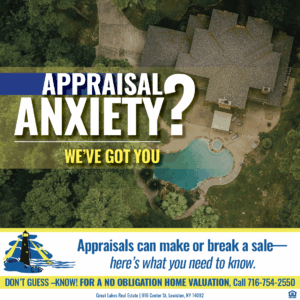Understanding Appraisals: What Buyers and Sellers Should Know Before Closing

Whether you’re buying your first home or selling a long-time property, one word can throw a wrench into your plans faster than almost anything else: appraisal.
It’s one of the most misunderstood steps in the closing process—yet it plays a huge role in whether your deal moves forward… or falls apart.
At Great Lakes Real Estate, we believe in making every part of the real estate process transparent. Let’s break down what an appraisal is, how it works, and how it affects both buyers and sellers.
What Is a Home Appraisal?
A home appraisal is a professional estimate of a property’s market value, conducted by a licensed appraiser. It’s required by lenders before they’ll approve a mortgage, to make sure the home is worth what the buyer is paying.
It’s not the same as a home inspection (which looks at condition). An appraisal focuses on value—based on recent comparable sales (comps), location, size, upgrades, and current market trends in Western New York.
Who Pays for the Appraisal?
Usually, the buyer pays for the appraisal. It’s part of the loan closing costs and typically runs between $400–$700, depending on the property and location. However, this can be negotiated depending on the terms of the contract.
Why It Matters (and Why It Can Kill a Deal)
Here’s the big reason appraisals matter: if the appraised value comes in lower than the purchase price, the lender may not approve the full loan amount.
This creates a few scenarios:
- Buyers may need to bring more cash to cover the difference.
- Sellers may need to lower the price.
- Or… the deal could fall apart entirely.
This is why it’s crucial to work with an experienced agent—like the ones at Great Lakes Real Estate—who know how to price listings strategically and negotiate smart offers.
What Causes a Low Appraisal?
- Market fluctuations or shifts in recent comps
- Overpricing by the seller or bidding wars driving offers too high
- Unique features that don’t add value on paper (even if they should)
- Appraisers who may be unfamiliar with the neighborhood
Western New York has some unique, fast-changing submarkets—especially in areas like Buffalo, Amherst, and Niagara Falls. That’s why it’s important to work with local experts who understand neighborhood nuances.
Can You Challenge an Appraisal?
Yes—if you believe the appraisal was inaccurate, your agent can work with the lender to submit a Reconsideration of Value. This includes presenting better comps or pointing out features that may have been overlooked.
Tips for Buyers and Sellers
Buyers:
- Get pre-approved before shopping.
- Understand appraisal contingencies in your offer.
- Don’t overextend yourself with emotional bidding.
Sellers:
- Price your home based on data, not emotion.
- Be prepared to negotiate if the appraisal comes in low.
- Consider getting a pre-listing appraisal if you’re in a unique market.
The Bottom Line
Appraisals are a vital checkpoint on the way to closing. With the right preparation—and the right guidance—you can navigate them confidently.
At Great Lakes Real Estate, we help our clients avoid surprises and handle every step of the deal with clarity and support.
Ready to move forward? Let’s talk today, 716-628-0051. Visit on online at www.greatlakesrealestate.com


